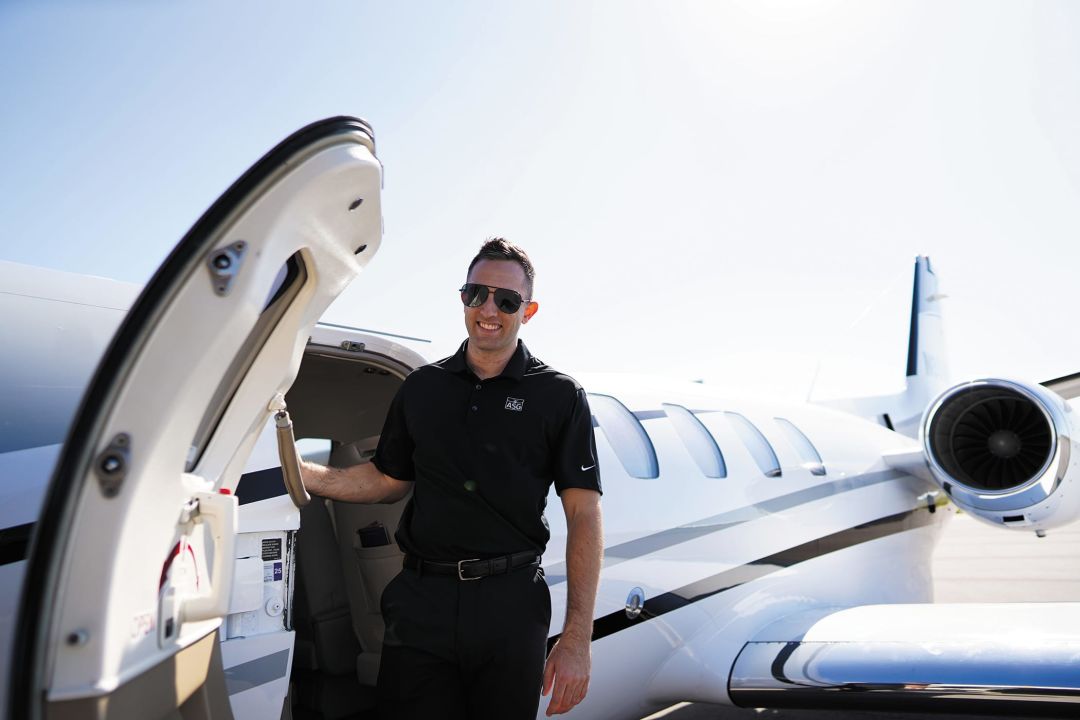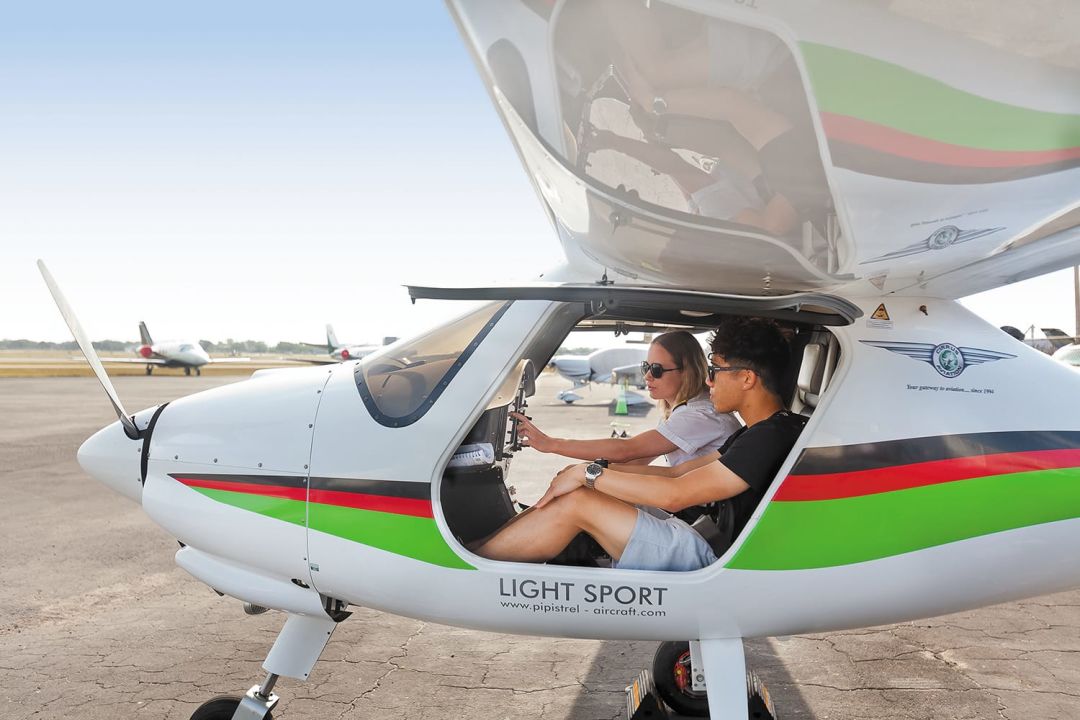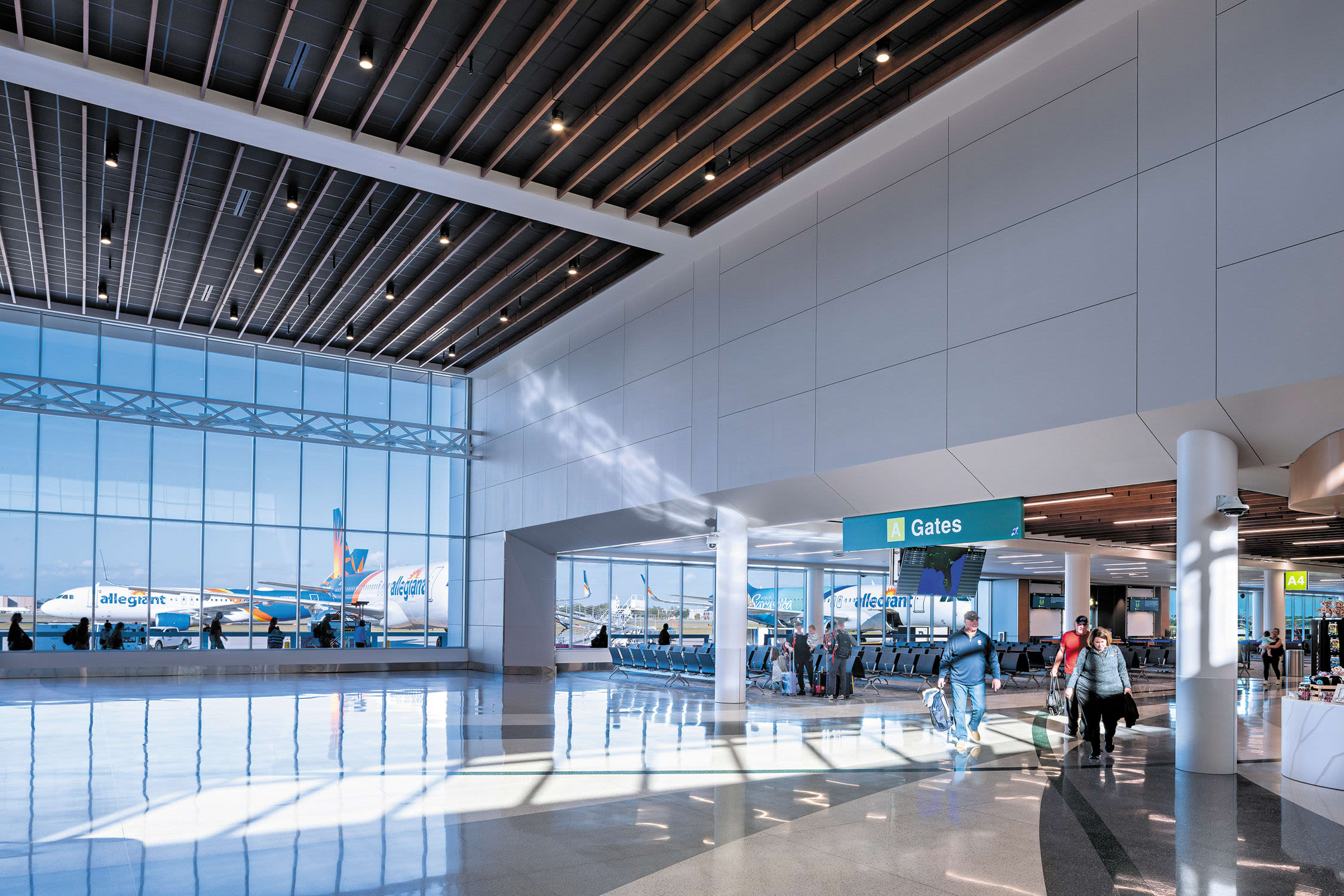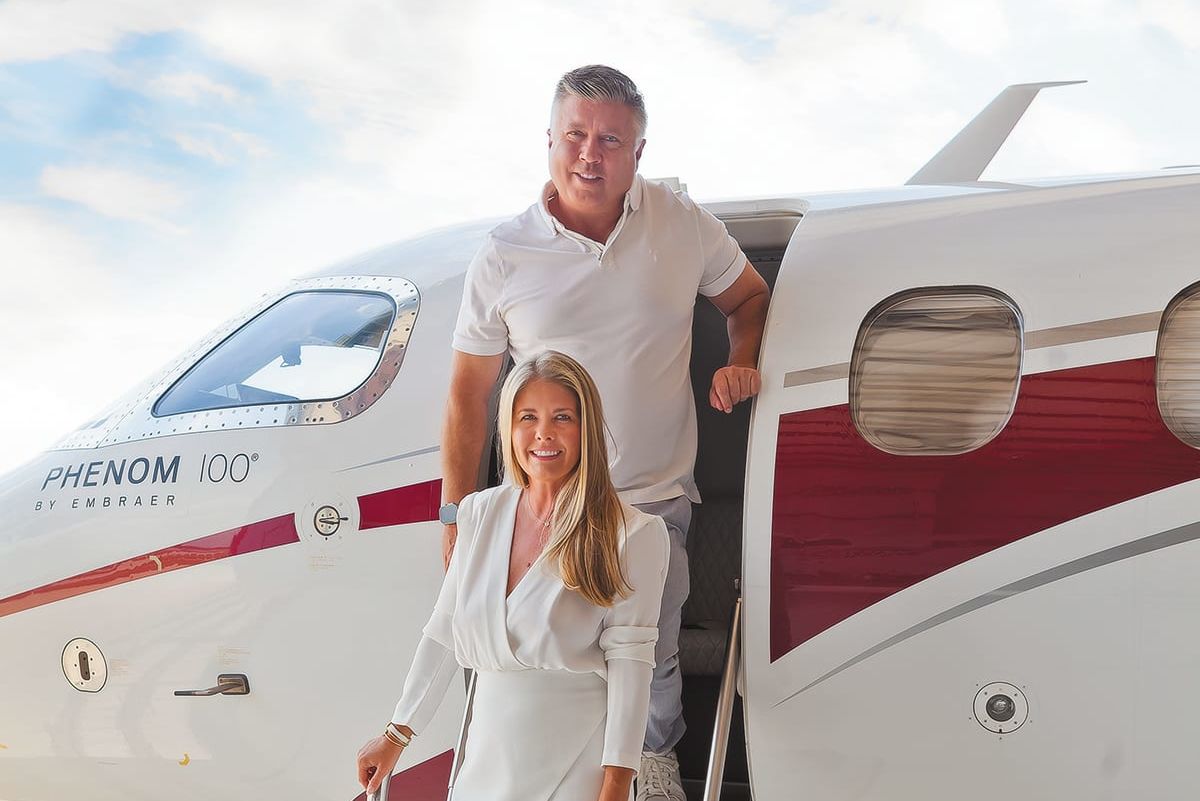A Variety of New and Expanding Businesses Is Fueling SRQ's Growth

SRQ has become one of the most financially self-sustaining airports in the country. It leases land to hotels and rental car companies, runs a thriving industrial park, and serves as a hub for general aviation, pilot training, maintenance and cargo. CEO Rick Piccolo says this diversification brings in $3.5 million and has allowed the airport to weather downturns and fund future improvements. Here are a few of the businesses that have just joined or expanded SRQ's commerce ecosystem, bringing in more revenue.
Aircraft Services Group
There are two kinds of people in private aviation: brokers and operators. The brokers sell the jets, but the operators run the show.
Andrew Reenstra is the latter. As president of Aircraft Services Group, a New Jersey-headquartered aviation company founded by his father in 1989, Reenstra manages an expanding fleet of private jets for owners who want to take to the skies without sweating the details. “We take care of staffing, maintenance, FAA compliance, accounting—every facet of management,” he says. “Some of our owners allow us to charter their planes out, which helps offset their costs.”
And the costs are considerable. Fixed annual expenses for jet ownership run between $500,000 and $1 million before anyone takes off. Then there are the variable costs: fuel (now $5 a gallon, with some aircraft burning 275 gallons per hour), landing fees and in-flight insurance. For clients who can afford it, Aircraft Services Group offers not just mobility, but ease: full-time pilots, charter sales, catering, ground transportation and, upon request, birthday balloons or sushi from your favorite local spot. “It's concierge-level,” Reenstra says.
The company’s operations span coast to coast—from Boston and Westchester to Long Island, Chicago and Texas—and Sarasota is its next destination. The group is building two new 30,000-square-foot hangars at SRQ, with the first slated for completion in December. “We’re already operating here with a small hangar,” Reenstra says. “This is just the next step.” The most popular destinations their clients fly to from SRQ are New York, Miami and D.C.
Reenstra’s father retired to Longboat Key 12 years ago. Their business partner, Peter Cuomo, also moved to the area, lured by proximity to family, sunshine and opportunity. “Naples and Tampa are at capacity,” Reenstra says. “SRQ is a hidden gem.”
As more executives, entrepreneurs and high-net-worth families have relocated to the area, demand for jet services has increased. “We saw it as a growth opportunity,” Reenstra says.
Aircraft Services Group deals in every class of aircraft: light, midsize, super-midsize and heavy jets. According to Reenstra, the sweet spot for jet buyers is usually somewhere between $10 million and $20 million, but the company has sold jets for as much as $63 million. Seating typically ranges from eight to 13 passengers, with interiors as varied as those in high-end homes and decked out with carbon fiber finishes, custom veneers, woodwork, plush leather and statement paint schemes. Some even include jump seats for flight attendants.
Struggling to make up your mind about which jet is right for you? “It’s all about what your mission is,” Reenstra says. A flight from Florida to the Northeast? A light or midsize jet would suffice. Coast to coast? “You’ll want a super-mid or heavy,” he advises.

Image: Gene Pollux
Cirrus Aviation
Cirrus Aviation has been in the air—figuratively and literally—in the Dolphin Aviation building just north of SRQ Airport since 1994. It started as a small passion project and, over time, became a national pilot training hub that now includes its own maintenance division and a newer operation that distributes flight simulators across North America. It serves hundreds of students, ranging from aspiring aces hoping to become commercial pilots, to people who just want to putter around on the weekends.
“We’re interested in developing programs for shortages in the industry,” says Nayda Cattin, who runs Cirrus with her husband, David. (Their teen daughter works part-time for the company, too.) “That’s dispatch, maintenance training, air traffic control,” Nayda continues.
The aviation industry is volatile. “World events, fuel prices, parts availability—it all affects us,” she says. During the pandemic, we lost all the people who did tooling on certain parts. Propellers, air filters, spark plugs—they just stopped being produced.” To meet the need, Cirrus created a maintenance division, Aero Maintenance Services, in 2014 that offers an apprenticeship program to train maintenance crews, dispatchers and air traffic controllers.
The company also launched Flight Sim Solutions two years ago to distribute high-fidelity simulators throughout the U.S. and Canada. “The goal is to sell about 20 simulators a year,” Nayda says. Each simulator costs approximately $300,000. “It’s a niche market, but it’s global,” she says.
Still, training pilots remains the most important part of their business. The Air Force used to be the main source of experienced pilots, but the U.S. military now prioritizes training drone operators and other technological specialists. Civilian flight schools pick up the slack. And because pilot salaries have exploded–starting pilot salaries hover around $80,000 and experienced captains’ pay can soar past $500,000–Cirrus is training a different kind of student. “Before 2015, most of our students were here recreationally,” says Nayda. “Now it’s 95 percent career-focused.”
There are also more women. “Fifteen years ago, only about 5 percent of student pilots were female,” says David. “Today, that number is closer to 30 to 35 percent.” Cirrus now employs four female instructors, with a fifth on the way.
Cirrus has a good home base in Florida. The U.S. is the world’s aviation training ground. More pilots are trained here than anywhere else, and Florida, in particular, is ground zero. According to Nayda, “one in four pilots in the world has gotten at least one license through the FAA office in Orlando.”
Sheltair Aviation Services
Sheltair, the largest family-owned fixed base operator network in the United States, is set to open its newest facility near SRQ by November. (A fixed base operator, or FBO, provides non-commercial, private and general aviation services.) The development includes a 10,705-square-foot terminal on 15 acres of aviation space, where jets can be parked, serviced, and fueled, and passengers can board and deplane.
The facility will also feature private lounges, crew rest areas and conference rooms. Once open, it will become the area’s third FBO, joining Dolphin Aviation and Atlantic Aviation. Its arrival will help meet the region’s growing demand for private and business aviation.
Sheltair—which has 16 locations across four states—provides hangar space, fuel and ground support for everyone from student pilots in Cessna 172s to private jet owners with aircraft worth $60 million or more.
“We’re essentially a high-end gas station for aircraft,” says Connor Fichtner, the company’s marketing director.
Sheltair already operates 12 locations in Florida, including Tampa, Clearwater and St. Petersburg, so expanding to Sarasota made sense. “We saw demand from our existing customers who live in Sarasota, and the airport was able to accommodate us,” says Fichtner.
Sheltair’s clients range from long-term tenants to transient visitors. While many use its services for business aircraft, Fichtner expects Sarasota to see a higher volume of transient traffic—seasonal visitors flying in for vacations or polo tournaments. “Many of these clients own second or third getaway homes in the area and need reliable aviation services,” he says.
The private aviation industry has surged since Covid-19, which accelerated demand for charter flights and personal air travel. “We’re seeing larger aircraft, with more passengers flying farther, faster,” Fichtner says. “While the Covid spike has stabilized, demand remains well above pre-pandemic levels.” That high life comes with high costs. A Gulfstream G650, for example, can run $2 million annually in upkeep. Pilot and crew salaries may add another $500,000, Fichtner notes.
As private aviation grows, so does scrutiny of its environmental impact and exclusivity. But Fichtner stresses that Sheltair’s mission is broader. “We do much more than serve the top 1 percent,” he says. “We support air ambulance services, disaster relief and government operations—like helping NOAA during hurricane season or transporting patients for medical treatment.”

Image: Pilatus Aircraft Ltd.
Building Planes
Two aircraft manufacturers expanded to SRQ in 2024.
Elixir Aircraft
Elixir Aircraft, a French manufacturer of light aircraft, built a 12,500-square-foot hangar at SRQ and plans to build another 6,000-square-foot facility to meet the growing demand in the American market. While its total annual production is about 300 planes, the company already has 200 aircraft preordered for the U.S. market. Elixir estimates it will employ 200 people in administration, aircraft assembly, delivery and customer support at its SRQ location by 2027. Parts will be shipped from its French manufacturing facility to the new SRQ location where they will be reassembled and then delivered to American customers. Its two-seater Rotax 912iS model was listed at about $300,000 in 2023.

Pilatus Aircraft
Pilatus Aircraft, the Swiss maker of the PC-12 turboprop and PC-24 jet, is building a $27.9 million flagship sales and service center at SRQ. The 17-acre site will feature 54,000 square feet for maintenance and deliveries, plus 17,000 square feet of office and workshop space. Set to open by mid-2026, the facility will launch with 50 employees and scale to 300 as it expands into aircraft assembly. Florida is already Pilatus’ busiest market, with more than 6,200 flight operations in 2022. Its PC-24 jet is priced at $11.5 million.



